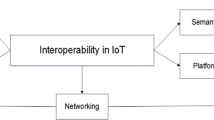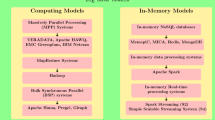Abstract
Today, multi-agent technologies are widely used for realizing prevalent ubiquitous computing applications, in which service discovery is a critical task for finding a particular service instance. While JADE is a popular system for multi-agent applications, its directory facilitator (DF) used for service discovery employs a sequential search approach, which shows degraded performance when the number of registered services becomes large. This paper proposes a new DF scheme employing the category-based classification and search approach. It greatly reduces the search space and allows accurate matchmaking. The DF implemented with the proposed approach and JADE-DF are compared in terms of query response time and memory space requirement. It demonstrates that the proposed DF allows faster query processing than JADE-DF and requires smaller memory space, especially for a large number of services and queries of multiple parameters.

















Similar content being viewed by others
References
Al-Masri, E., & Mahmoud, Q. H. (2008). Investigating Web Services on the World Wide Web. Proceedings of the 16th international conference on World Wide Web 2008, 795–804.
Balachandran, B. (2008). Developing intelligent agent applications with JADE and JESS. Knowledge-Based Intelligent Information and Engineering Systems, Lecture Notes in Computer Science, 5179, 236–244.
Chen, B., Cheng, H. H., & Palen, J. (2009). Integrating mobile agent technology with multi-agent systems for distributed traffic detection and management systems. Transportation Research Part C: Emerging Technologies, Elsevier 2009, 17(1), 1–10.
Chiu, D. K. W., Yueh, Y. T. F., Leung, H. F., & Hung, P. C. (2009). Towards ubiquitous tourist service coordination and process integration: a collaborative travel agent system architecture with semantic web services. Information Systems Frontiers, Springer 2009, 11(3), 241–256.
Fabio, B., Agostino, P., & Giovanni, R. (2000). Developing multi-agent systems with a FIPA-compliant agent framework. Software: Practice and Experience 2000, 31(2), 103–128.
FIPA: The Foundation for Intelligent Physical Agents. (2007). http://www.fipa.org/.
García-Sánchez, F., Valencia-García, R., Martínez-Béjar, R. & Fernández-Breis, J. T. (2009). An ontology, intelligent agent-based framework for the provision of semantic web services. Expert Systems with Application, Elsevier 2009, 36(2), 3167–3187.
Gouda, K. A., Cheng, J., & Ushijima, K. (1999). DASS: a discovery agent supporting system. IEEE Systems, Man, and Cybernetics, 5, 894–899.
Hong, J., Suh, E., Kim, J., & Kim, S. (2009). Context-aware system for proactive personalized service based on context history. Expert Systems with Applications, 36(4), 7448–7457.
IBM Japan Research Group. (2007). Aglets. http://www.trl.ibm.com/aglets.
Ibrahim, A., & Zhao, L. (2009). Supporting the OSGi service platform with mobility and service distribution in ubiquitous home environments. The Computer Journal 2009, 52(2), 210–239.
JADE: Java Agent Development Frame work. (2007) http://jade.tilab.com/.
Jennings, N. R. (2001). An agent-based approach for building complex software systems. Communications of the ACM 2001, 44(4), 35–41.
Jiao, W., & Shi, Z. (1999). A dynamic architecture for multi-agent systems. Proceeding of TOOLS 1999, 253–260.
Kim, D. U., Lee, G. H., Lee, K. M., Heo, S. P., Choi, K. H. & Shin, D. R. (2007). Design and implementation of advanced directory facilitator for efficient searching. Advanced Communication Technology, 403–406.
Lee, G. H., Lee, S. H., Choi, K. H., & Shin, D. R. (2008). Design of CALM-based service discovery system. Networked Computing and Advanced Information Management, 1, 280–285.
Luck, M., McBurney, P., Shehory, O., & Willmott, S. (2003). Agent technology: enabling next generation computing. AgentLink Community.
Moreno, A. (2008). Agent Applications in Tourism. Whitestein Series in Software Agent Technologies, 2008, 179–206.
Na, S. J., Kim, D. U., Yoon, Y. J., & Shin, D. R. (2008). Design of location-based directory facilitator in context-aware environment. Advanced Communication Technology, 2107–2110.
Naumenko, A., Nikitin, S., & Terziyan, V. (2006). Service matching in agent systems. Lecture Notes in Computer Science, 25, 223–237.
Object Management Group Agent technology, Technical Report 2000. http://www.objs.com/agent/.
Park, A. H., Park, S. H., & Youn, H. Y. (2007). A flexible and scalable agent platform for multi-agent systems. Transactions on Engineering, Computing and Technology, 19, 1–6.
Payne, T. (2008). Web services from an agent perspective. IEEE Intelligent Systems, 23(2), 12–14.
Rhee, S. W., Jeon, K. Y., Song, S. K., Lee, H. S., & Youn, H. Y. (2008). A dynamic weighting scheme for providing fair communication service to nomadic agents. Proceeding of ISDA 2008, IEEE, Kaohsiung, 468–473.
Seghrouchni, A. E. F., Florea, A. E., & Olaru, A. (2010). Multi-agent systems: a paradigm to design ambient intelligent applications. International Symposium on Intelligent Distributed Computing, 2010, 3–9.
Song, S. K., Han, S. W., & Youn, H. Y. (2007). A new agent platform architecture supporting the agent group paradigm for multi-agent systems. Proceeding of IAT 2007, IEEE, Fremont, 399–402.
Stefano, B., Visara, U., Maxime, M., Kostas, S., & Francesca, T. (2009). A multi-agent system for service discovery, selection and negotiation. International Conference on Autonomous Agents, 2, DEMONSTRATION SESSION: Academic demos, 1395–1396.
TinyXML. (2008). Library http://www.grinninglizard.com/tinyxml/.
Wang, K. I. K., Abdulla, W. H., & Salcic, Z. (2009). Ambient intelligence platform using multi-agent system and mobile ubiquitous hardware. Pervasive and Mobile Computing, Elsevier 2009, 5(5), 558–573.
Wei, E., & Chan, A. (2007). Towards context-awareness in ubiquitous computing. Embedded and Ubiquitous Computing, Lecture Notes in Computer Science, 4808, 706–717.
Weyns, D., Haesevoets, R., Helleboogh, A., Holvoet, T., & Joosen, W. (2010). The MACODO middleware for context-driven dynamic agent organizations, ACM Transactions on Autonomous and Adaptive Systems, 5(1).
Wong, W. S., Aghvami, H. & Wolak, S. J. (2008). Context-aware personal assistant agent multi-agent system. IEEE International Symposium on Personal, Indoor and Mobile Radio Communications, 2008, 1–4.
You, Y.K., Han, S.W, Song, S.K & Youn, H.Y. (2007). Context-based dynamic channel management for efficient event service in pervasive computing. Proceeding of ICCSA 2007, 24–32.
Acknowledgments
This research was supported by a grant (CR070019) from Seoul R&BD Program funded by the Seoul Development Institute of Korean government.
Author information
Authors and Affiliations
Corresponding author
Rights and permissions
About this article
Cite this article
Han, S., Youn, H.Y. & Song, O. Efficient category-based service discovery on multi-agent platform. Inf Syst Front 14, 601–616 (2012). https://doi.org/10.1007/s10796-010-9281-x
Published:
Issue Date:
DOI: https://doi.org/10.1007/s10796-010-9281-x




